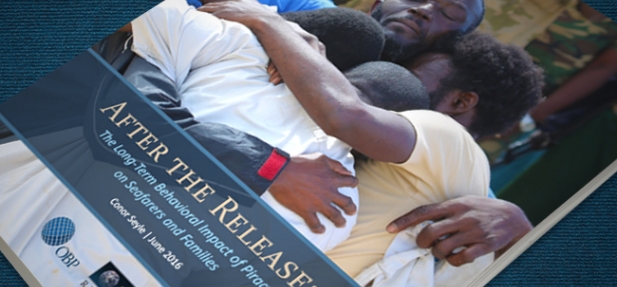A new joint report by OBP and OEF Research, both programs of the One Earth Future Foundation explores the long-term impact of piracy on seafarer and family recovery. It is based on a series of interviews and structured surveys collected from 465 seafarers in three major seafaring countries: India, the Philippines, and Ukraine. These seafarers included 101 former hostages and 364 non-hostages, and also 38 family members of seafarers.
More than 3,000 seafarers have been held hostage by Somali pirates since 2001, with a significant, but unknown, number of seafarers kidnapped in other parts of the world. These seafarers, and their families, have faced fear and uncertainty, and in some cases, direct abuse. In addition to the 41 seafarers who remain in captivity as of the release of this report, the thousands of seafarers who have returned to their regular lives after being held hostage must address the challenges of reintegration and coping with their experiences.
The report, developed in partnership with ISWAN/MPHRP and supported by the TK Foundation, documents significant negative long-term impacts to seafarers who have been taken hostage following an act of maritime piracy. Notably, seafarers who had been held hostage were nearly six times more likely to exhibit symptoms like post- traumatic stress disorter (PTSD) and depression. However, those impacts can be alleviated through training and programs focused on seafarer well-being.
Key Findings
- Seafarers are resilient, but a sizeable minority of hostages show lasting effects. Most seafarers who have been held hostage do not show lasting impairment in their mental or behavioral health, but 25.77% of former hostages have symptoms consistent with Post-Traumatic Stress Disorder (PTSD). These seafarers are at higher risk of having poor overall well-being, as well.
- Being held hostage, more than any other type of piracy experience, leads to lasting effects. Many seafarers are exposed to different types of threats from pirates, ranging from the tensions of transiting through the high-risk areas to actually being attacked. Only hostage experiences are related to a significantly increased risk of PTSD.
- Seafarers are exposed to a fairly high number and degree of traumatic experiences in the course of their regular employment. The maritime environment is dangerous, and seafarers are regularly exposed to traumatic experiences other than piracy. These experiences have an independent impact on post-traumatic stress symptoms and can negatively affect seafarer well-being.
- Traumatic experiences impact the decisions seafarers make about their work. Seafarers with higher levels of post-traumatic stress symptoms are more likely to think about piracy when taking contracts, and more likely to have declined a job due to piracy risk.
- Families of hostages can have problems getting information about their loved ones, and many suffer lasting distress. Less than 50% of family members of hostages feel that they had good information about what was happening to their seafarer, and more than 30% of spouses of seafarers report that they have no idea how they would get information if something bad happened while their seafarer was at sea. A large minority of the family members of hostages show lasting behavioral effects from their experiences.
The report recommends the following three pillars to piracy response
- Part of the response to maritime piracy should help seafarers prepare for potential exposure to pirate attack and cope with their experiences during and after the event. This should be an integrated response including pre-event planning and training and during event management as well as post-event support and care. Care for the families should also be an integral part of the response.
- Post-event care should include social integration and support as well as targeted mental health support. All hostages will benefit from the former, and a minority will need the latter.
- Programs designed to mitigate the long-term impact of piracy should also support resilience in the face of other traumatic maritime events
Explore more by reading the report
Source: Oceans Beyond Piracy
































































